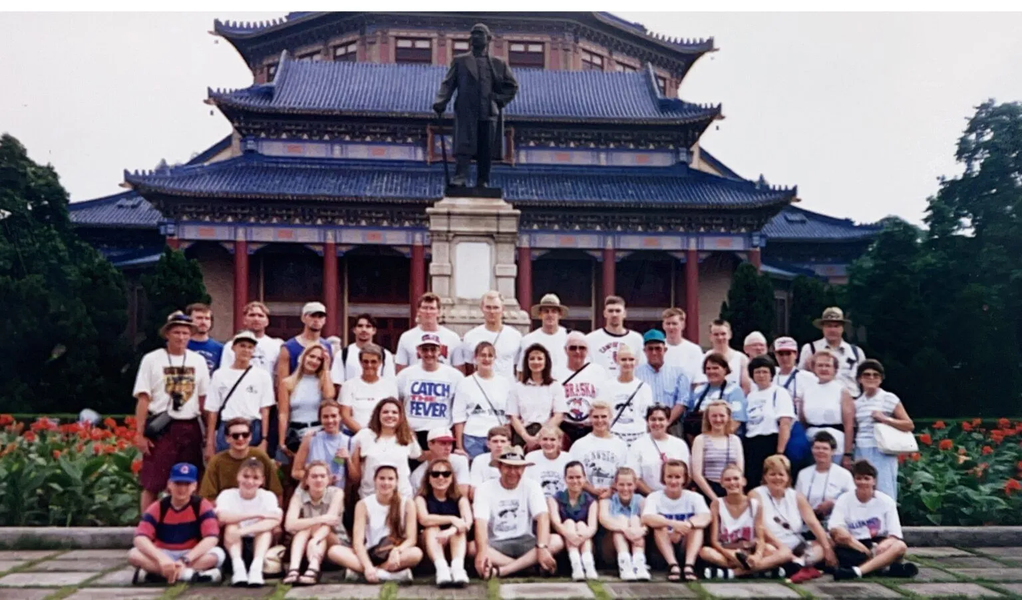In June 1994, Tim Walz led a group of Nebraskans on a two-week trip to China, an endeavor that has garnered criticism from Republicans regarding his alleged connections to the Communist country. In the context of escalating tensions between the United States and China, Walz, who is currently serving as Kamala Harris’ running mate, faces scrutiny over whether he is compromised or overly accommodating to China. His past role as a fellow at Macau Polytechnic University, an institution with strong ties to the Communist Party, highlights his controversial relationship with China. Notably, during the vice-presidential debates, Walz insinuated that if Donald Trump had participated in such educational tours, he would have criticized the Chinese leadership and handled the trade war differently. This assertion raises questions about the basis of Walz’s understanding of the conflict, given that Trump’s initial stance toward China was one of criticism and confrontation, particularly in response to China’s handling of the COVID-19 pandemic and the unfair trade practices that characterize U.S.-China relations.
Walz’s comments suggest he might underestimate the reasons behind Trump’s initiation of the trade war, which stemmed from China’s unfair economic practices, including the manipulation of currency and the subsidization of state-owned enterprises. These practices not only hurt American businesses but also allowed China to dominate various international markets while keeping a significant portion of its population in poverty to maintain low export prices. When Trump initiated the trade war in 2018, U.S. tariffs on Chinese goods were considerably lower than China’s tariffs on American imports. U.S. agricultural products faced steep tariffs, impacting vital industries reliant on trade. As such, Trump’s claims that China poses a primary military threat to the U.S. were grounded in a broader strategy to secure American economic interests and national security, further necessitating a critical approach to trade with China.
The ongoing scrutiny surrounding Walz became more pronounced in August when the House Committee on Oversight and Accountability launched an inquiry into his connections to China following whistleblower reports from within the Department of Homeland Security. While Walz initially overstated his number of trips to China, this discrepancy only served to deepen doubts about his accountability and transparency regarding his ties to the People’s Republic of China (PRC). Republican Chairman James Comer has renewed requests for information about Walz’s engagements with the Chinese Communist Party (CCP) and his role in securing federal funds for initiatives tied to institutions associated with controversial aspects of Chinese governance. This inquiry raises significant concerns about the implications of Walz’s connections for his decisions as both a member of Congress and as a governor.
The investigation not only highlights Walz’s history of interactions with Chinese entities but also reveals potential shifts in policy priorities should he ascend to a national position such as vice president. His previous work, including leading Educational Travel Adventures, Inc., which organized trips to China, alongside Minnesota’s universities maintaining Confucius Institutes, showcases an ongoing engagement that some view as aligning with CCP influence operations. Despite pressure from the Trump administration, such institutions still functioned in the state, raising alarms about foreign influence in educational settings. These affiliations amplify calls for transparency regarding Walz’s dealings with the Chinese government and its associated institutions and efforts that may not align with American interests.
America First Legal (AFL), which initiated a separate investigation into Walz’s connections, has raised awareness regarding entities like the Beijing Genomics Institute, which poses intelligence and security risks as per the assessments from U.S. intelligence agencies. The concern stems from the potential collection of sensitive genetic data, which could serve dual purposes for both surveillance and advancing China’s military capabilities. AFL has focused on acquiring records and communications that might illuminate the extent of Walz’s engagements with organizations such as the Confucius Institutes and the Chinese Ministry of Education, further seeking clarity on how these relationships might influence Minnesota’s security landscape and illustrative governance.
Critics are increasingly vocal about the implications of Walz’s history of sympathetic engagement with the CCP, pointing to risks that such affiliations pose to U.S. national security, especially if such perspectives find their way into policy making at higher levels of government. With the Harris-Walz ticket emerging amid claims of leniency towards issues like immigration and crime, skepticism about their foreign policy stances, particularly concerning China, is mounting. The existing political context amplifies these concerns, signaling how Walz’s past could reflect broader strategies affecting national security and domestic policy if he were to gain a more influential role. Balancing the geopolitical implications of U.S.-China relations with domestic policy outcomes continues to remain a contentious and critical topic as the election draws nearer.

